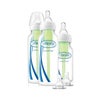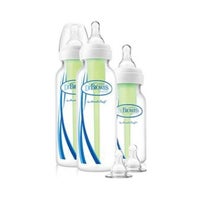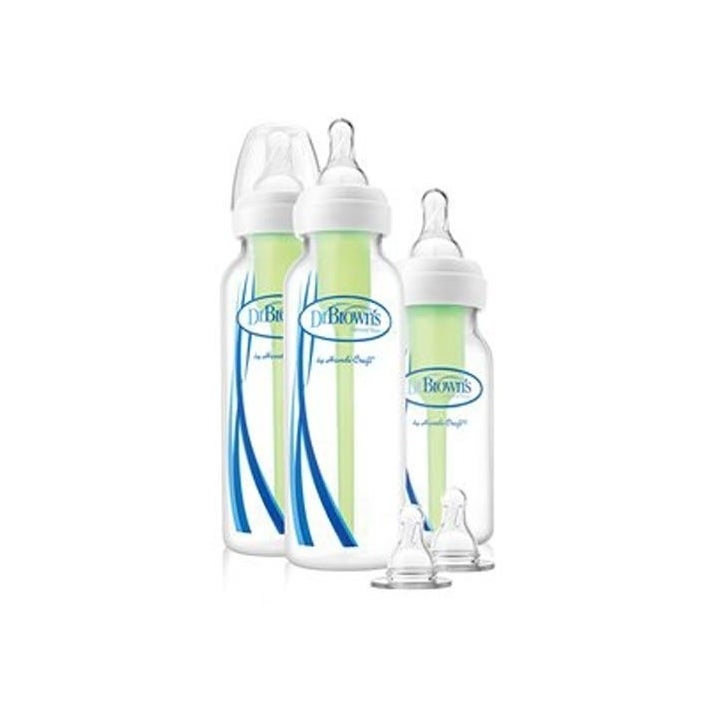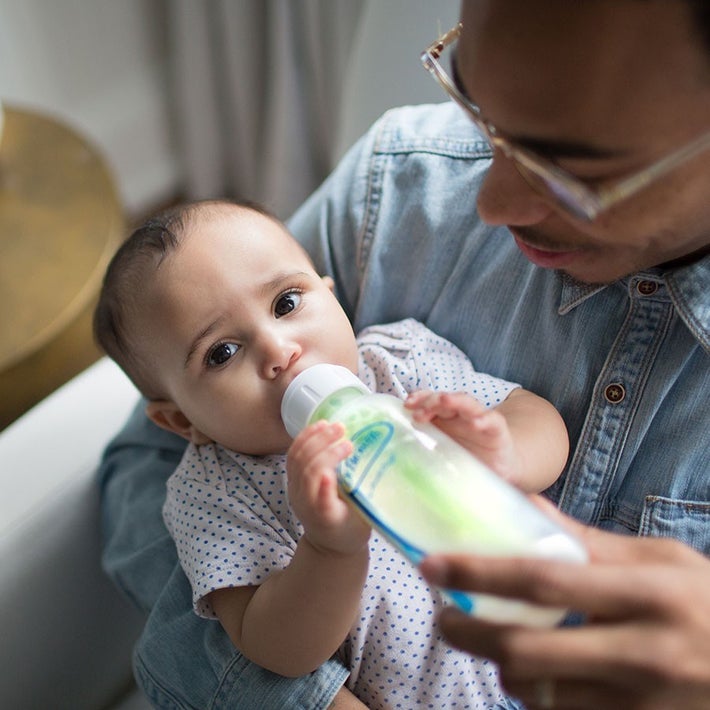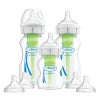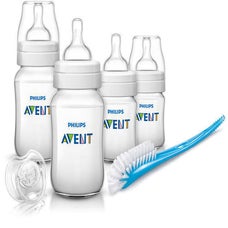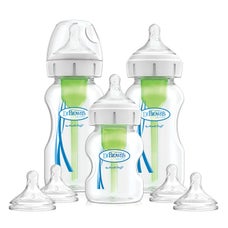
- Details
- Delivery & Returns
- Specs
- What you get
- FAQs
- Video
Details
Dr. Brown's Natural Flow baby bottle was invented by a doctor and tested on his own children when they were babies, so you can rest. It is assured that this product is as safe as it is effective.
Patented internal vent system is proven to minimise oxidation of breastmilk and formula to help maintain essential nutrients.
Fully-vented bottle design provides vacuum-free feeding similar to breastfeeding. Vent system eliminates the negative pressure and air bubbles to help reduce colic, burping and wind
Features:
- Helps reduce the chance of colic, spit-up, burping, gas and other feeding problems
- No vacuum pressure, so your baby can feed at will for good digestion
- Preserves bottle milk nutrients by reducing air bubble oxidation
- Vent provides a breastfeeding-like experience and helps prevent nipple collapse
- Vent can be removed for the convenience of a nipple-vented bottle Fits most breast pumps (not included)
- BPA-free construction
- Made in the USA
- Comes with Level 1 and 2 teats, 120ml and 250ml bottles and a cleaning brush (See What you Get)
*Made of super-soft, high-grade silicone, each nipple level provides a different flow rate. Keep in mind however that the Bottle Nipple Chart serves as a general guideline for choosing a bottle nipple but is by no means an “end-all” solution. It is important to carefully watch the feeding habits of your little one. For instance, is your three-month-old not seeming to get enough from the bottle at feeding time? Moving them up from a Level One to a Level Two bottle nipple may be in order. Adapt your bottle nipple selection to match your baby’s feeding style, regardless of age!

Delivery & Returns
Delivery:
We can deliver to any mainland New Zealand physical address. (Sorry, this excludes Chatham Islands, Stewart Island and Waiheke Island - please contact our Customer Services Department for freight options)
$7.00 Freight Charge for any orders under $100 when delivered within New Zealand
Free Freight for any orders over $100 when delivered within New Zealand
$5 surcharge for rural deliveries
Oversized items freight costs will be:
$30 North Island, $70 South Island per oversized item - if a rural delivery please contact customerservices@babyfactory.co.nz for a freight cost.
Gift Vouchers: Freight is FREE for all Physical Gift Vouchers purchased to go to a New Zealand address.
Overseas Orders: We also ship overseas. All our overseas orders go by New Zealand Post (with a tracking service). Overseas freight charges will be confirmed when you check out.
If you have any questions regarding shipping please contact us at customerservices@babyfactory.co.nz
*Please note the free freight offer only applies to orders made online at www.babyfactory.co.nz and delivered within New Zealand. Exclusions for oversized items may apply.
Please allow:
2 - 3 working days for Auckland deliveries
3 - 4 working days for North Island deliveries
5 - 6 working days for South Island deliveries
Rural Deliveries: 2-3 extra days for rural deliveries. Please mention your RD number when placing your order.
Around public holiday periods - please allow a few extra working days. During the Christmas period - please expect courier delivery to take a little longer than usual.
Please Note: Breast Pumps and Toilet Training Items are unable to be returned (exchanged or refunded) due to Health Reasons
Specs
- BPA-free construction
- Bottles: 120ml, 150ml
- Teats: Level one, two
- Cleaning Brush
With the vent, benefits include:
- Helps reduce feeding problems – which may include colic, spit-up, burping and gas.
- Proven to help preserve bottle milk nutrients – Vitamins C, A, and E are critical for health in infancy.
The Dr Brown’s vent system reduces air bubble oxidation to help preserve nutrients.
This is important because vitamins and lipids are fragile, and susceptible to nutrient loss. - Vacuum Free Feeding helps digestion, particularly in newborns.
The vent eliminates vacuum pressure in the bottle, so baby can feed at will, even as a newborn. - Fully-vented bottle design – Closest to breastfeeding.
The vent also helps prevent nipple collapse so baby can feed comfortably, like breastfeeding. - Internal Vent System and silicone nipple work together – Controlled flow so babies feed at their own pace.
The internal vent and silicone nipple are highly engineered to provide a consistent milk flow
What you get
- Includes: 2 x 250ml bottles, 1 x 120ml bottle, 3 x Level one teats, 2 x Level two teats, 1 x Cleaning brush (for vent insert)
- Instructions
FAQs
The summary below has been based on information provided by the manufacture of the Dr Brown’s Fully Vented bottle in the USA - some of the information you may already be familiar with.
As the Dr Brown's bottle is fully-vented, it allows positive-pressure flow, similar to breastfeeding. This is essential for the baby to feed without having to suck against a vacuum, may help with wind, colic, discourages ear infections and preserves the vitamins in the formula or liquid. However, at times, milk or formula can exit the bottle through the vent if the bottle is not handled or used properly. Slight errors can occasionally cause milk to leak out the vent, or a slight symmetry or fitting issue with the internal vents when placed inside.
1) Do Not Overfill the Bottles
Do not exceed the fill-line of the bottles otherwise the extra liquid may escape into the vent and then exit out the two vent holes on the side under the collar. To note, if you use formula, make sure the combination of powder and water does not exceed the Fill line.
2) Do not Heat the Milk With the Vent in Place
As milk is heated it expands. If you keep the Dr Brown’s vent in place as you heat milk or formula, the liquid will be forced up into the vent and cause leaking. To avoid this problem, either heat your bottles without the vent in or loosen the teat collar after heating the milk so that the pressure can equalize and the milk can leave the vent. Then re-tighten the collar.If you place the Internal vent into milk that is overheated, the milk may rise and condense inside of the vent. Therefore always wait until the milk is cool enough for your baby to actually use before placing the vent inside.
3) Do Not Shake the Bottle With the Vent Inserted
If you shake your bottles to mix formula while you still have the vent inserted, you are likely causing liquid to enter the vent and leak out later. There are a couple ways to avoid this problem. Mix the baby formula by stirring the liquid instead of shaking it. This has the added benefit of reducing air bubbles which may future reduce infant wind and colic. If you prefer shaking your bottles, use the Dr Brown’s Storage Caps. Shake with the cap in place, and when the formula is properly mixed you can remove the cap and insert the full vent. It is best to wait for the air bubbles to subside as well.
4) Do not Submerge the Reservoir Tube
When feeding your baby, avoid keeping the bottle perfectly level. Avoid submerging the reservoir tube under liquid as you feed your infant. as you might end up with some leakage. The ideal angle is 45 degrees during feeding. This should keep the end of the tube out of the the liquid. If liquid does end up inside the reservoir tube, all you need to do is stop the feeding, turn the bottle upright, and loosen the teat collar a bit to release the built-up pressure. The milk should then fall back into place at the bottom of the bottle, and you can then re-tighten the collar and resume feeding.
5) Do not Over-Tighten or Under-Tighten the Teat Collar
Both over-tightening or under-tightening the Teat collar can cause leakage. Over-tightening causes too much pressure to build up, and under-tightening the collar doesn't allow the bottle to form the seal that holds back the liquid during feeding. A suggestion would be to twist the collar onto the bottle until you feel a small amount of resistance, then give it one more half-turn.
6) Use an Age-Appropriate Teat
If your baby is sucking on the teat too hard, the baby could cause the teat seal to break. If this happens to you, you likely to need to move up to a faster-flow Teat. On the other hand, if your baby tries to block the flow or slow down the milk, the infant can cause fluid to be forced backward into the vent. If that happens to you, then you probably need to move to a slower-flow teat.
7) If you are using a Bottle Warmer (or standing the bottle in boiling water) to heat up, you may need to open and close the bottle top a few times to release the pressure inside the bottle. During warming, the liquid expands and creates pressure which will cause the milk to travel up the vent tube, where it may leak out of the side vent holes and collar. Warming the bottle without the vent system or cap on, may prevent leaking.
8) If you are placing the bottle in a travel bag - make sure to use Travel Caps to close the bottle. This will avoid the liquid possibly exiting the two vent holes on the side of the bottle should the bottle build up pressure from warm liquid , or if the bottle falls to the side or on an angle while travelling.
9) If leaking is coming from the top of the teat hole - please note: Dr Brown’s bottles feature an open venting system which allows milk to flow freely from the teat hole. We suggest keeping the bottle upright at all times when not is use, and using a flat screw-on travel cap when transporting the bottle.
Video
Reviews
Write Review Read Less
Awesome
Jim posted - 20 January 2020


